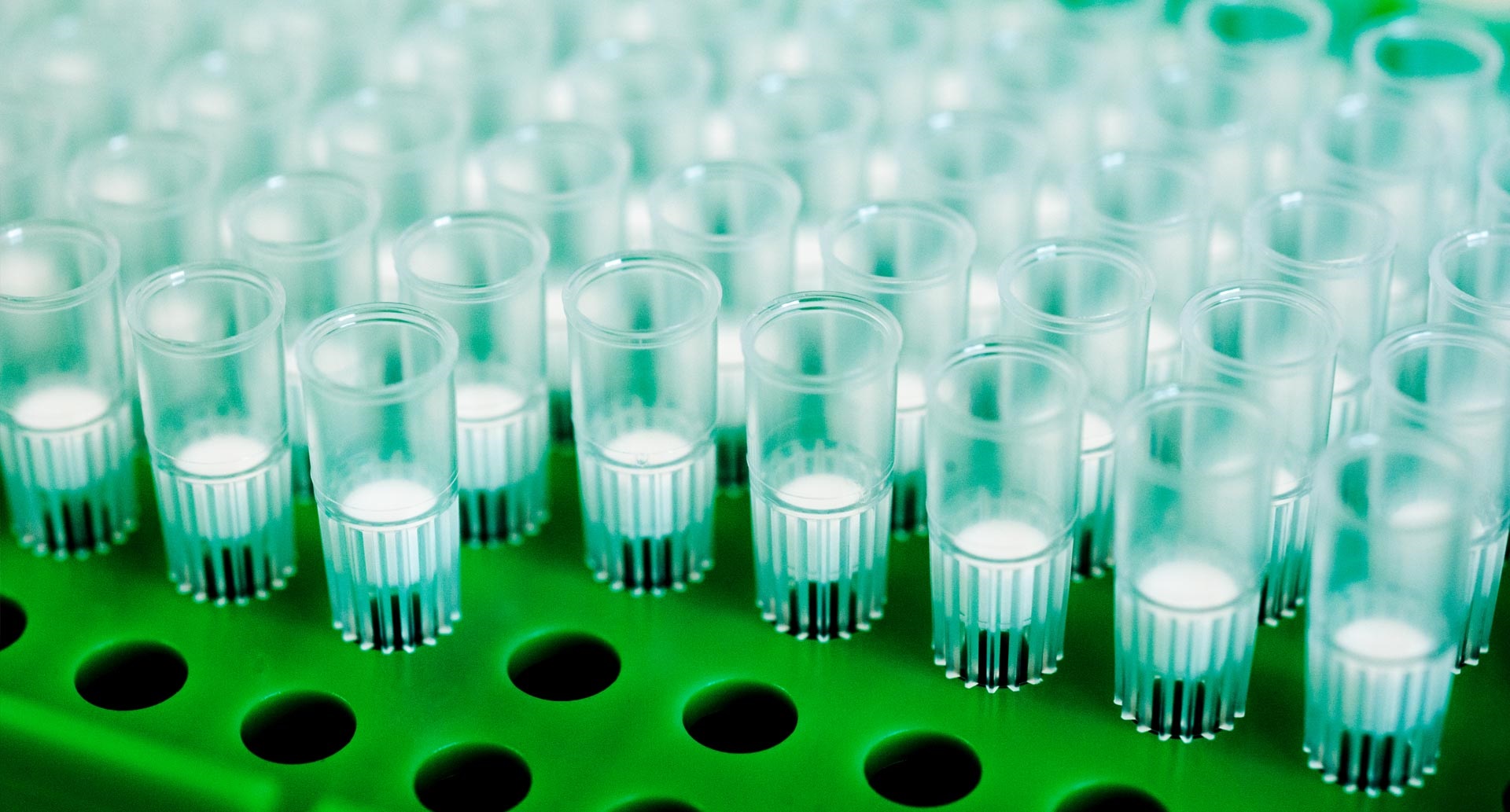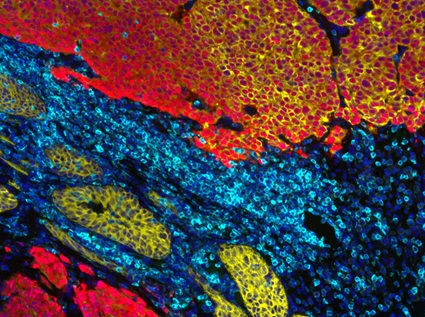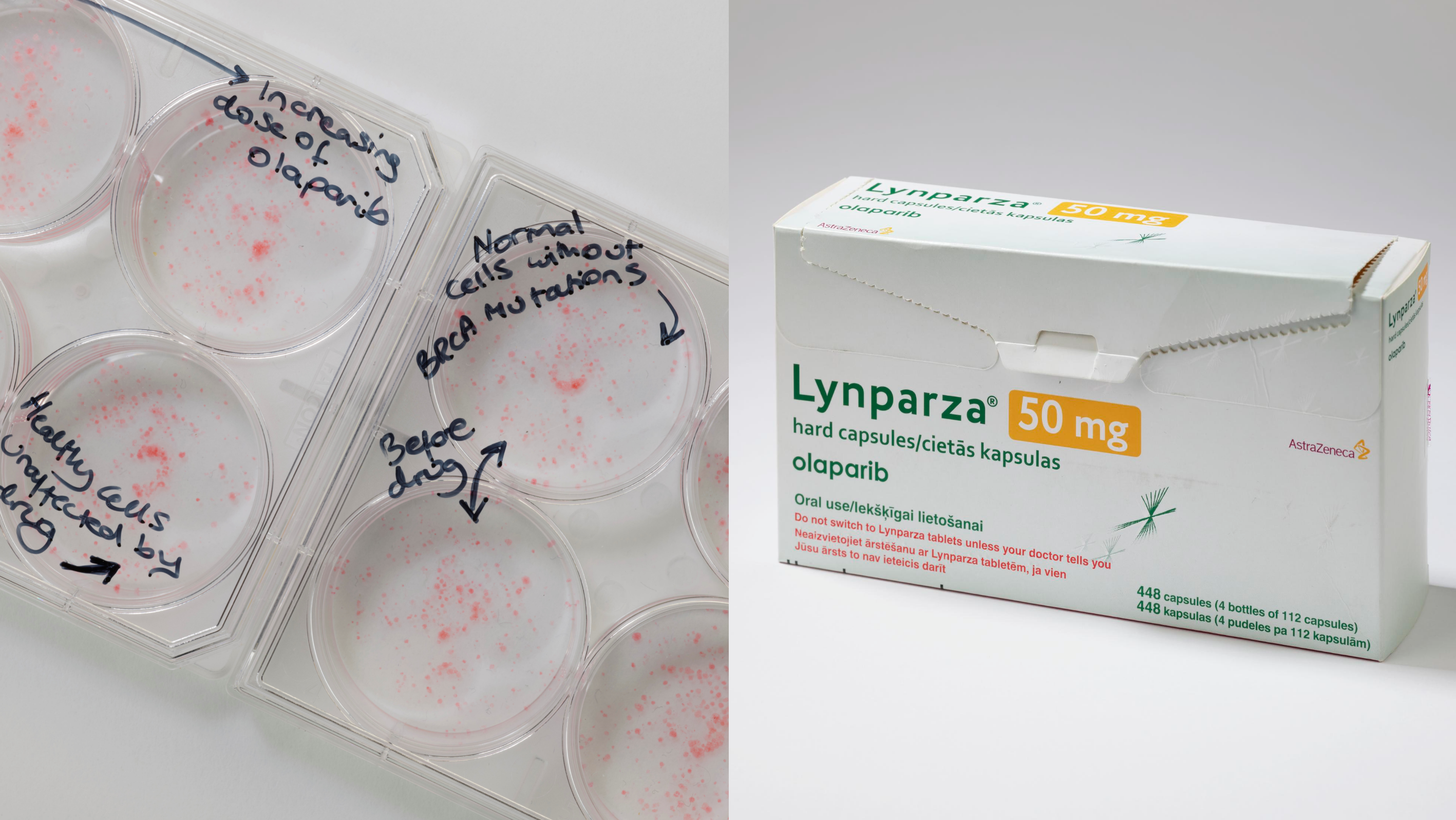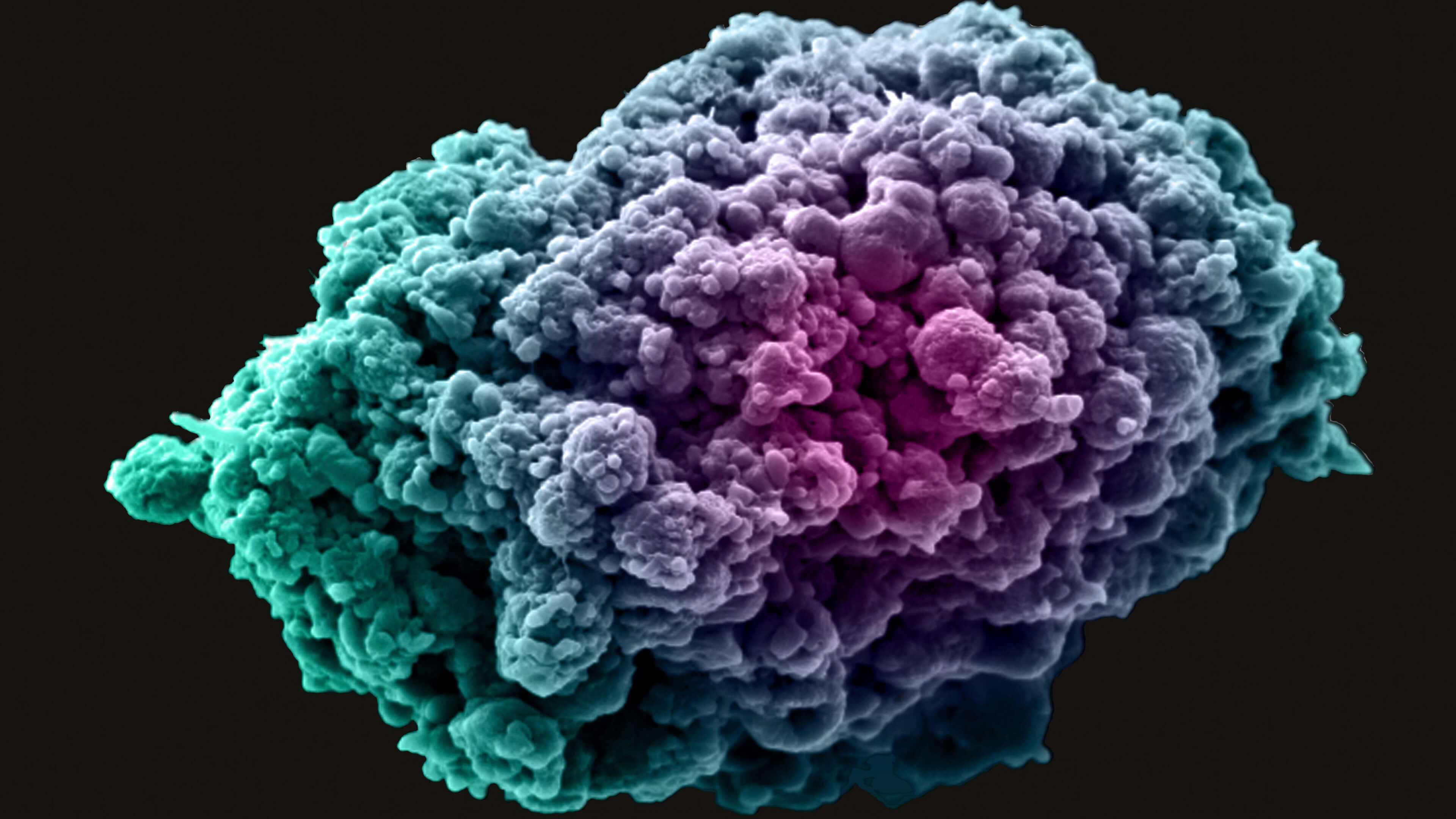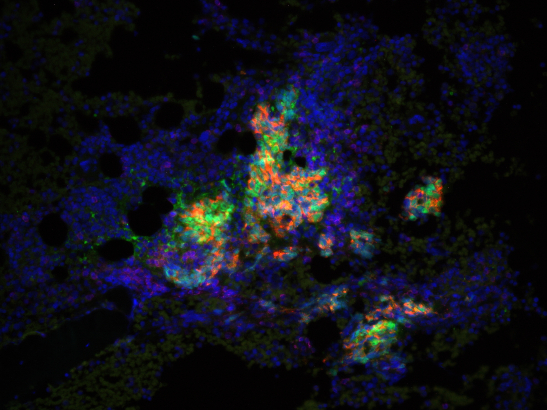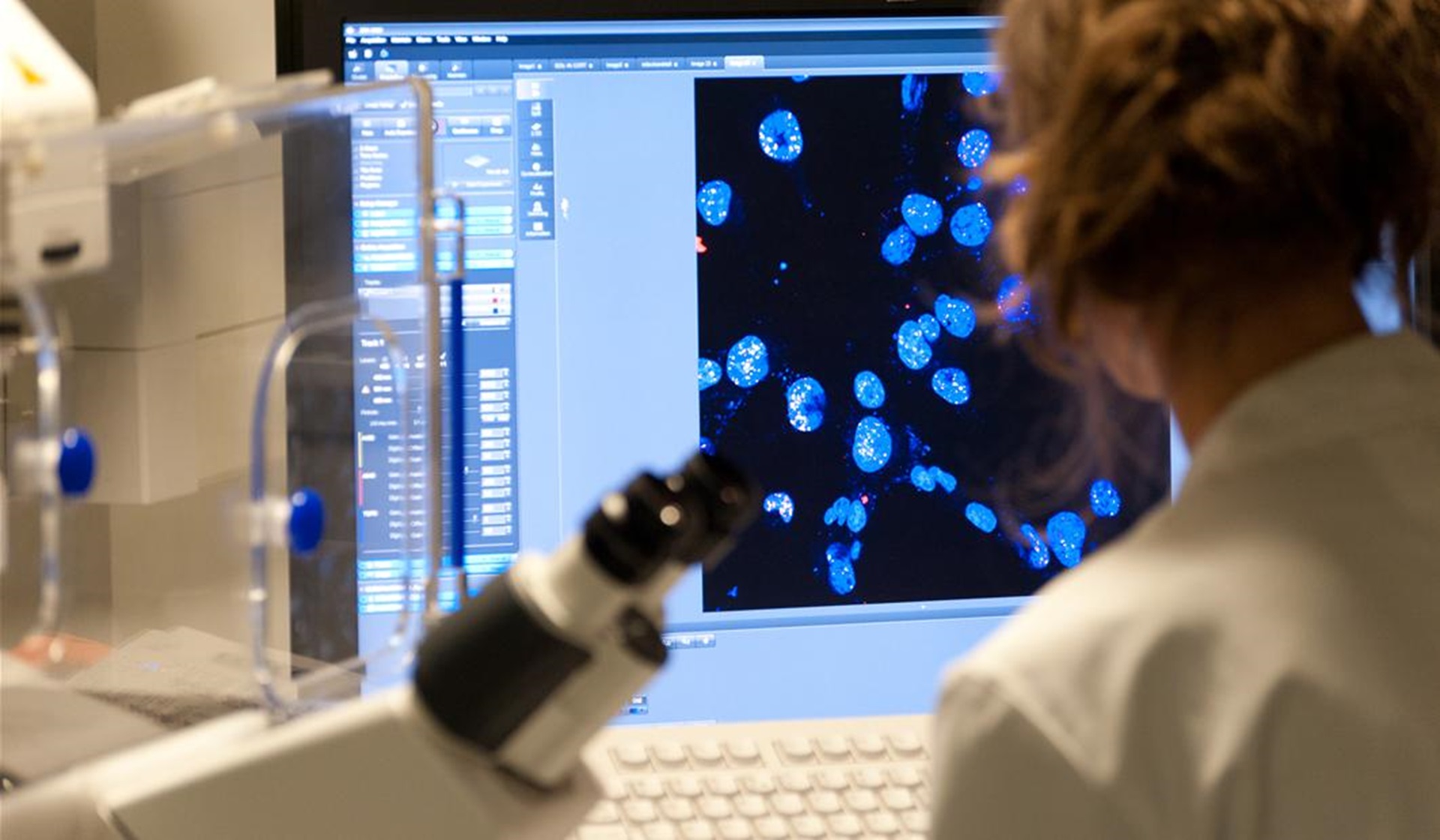Centre for Genome Stability
at the ICR and The Royal Marsden
Centre for Genome Stability (CGS) is a unique multidisciplinary programme bringing together experts from across the ICR and The Royal Marsden who work on DNA-damage response and genome instability research with clinical experts in the treatment of cancer.
How we research at this centre
Our world-leading centre of excellence aims to understand genetic, epigenetic and proteomic changes to genomic stability in the development of cancer in order to develop biomarkers and therapeutic targets for improved cancer treatment. This will allow us to apply multidisciplinary approaches to address important research questions, thus accelerating discoveries into the causes of tumorigenesis and delivering major clinical impacts, both nationally and internationally.
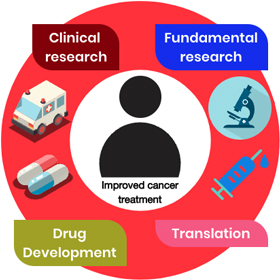
We aim to harness the breadth of expertise in genomic stability at the ICR to develop new and better therapies against cancer to make the most meaningful impact in clinics.
The centre will establish a single-domain antibody screening facility to generate DNA-repair related biomarker detection and intracellular antibody protein perturbation tools.
The Centre's main themes are as follows:
Molecular Mechanisms of Genome Stability Maintenance
Maintenance of genome stability is accomplished throughout the cell cycle by a complex network of proteins referred to as the DNA-damage response (DDR) pathways. Mutations in DDR factors are associated with elevated cancer predisposition. Understanding this will allow us to target tumour-specific DDR dependencies for improved cancer treatments.
Understanding Replication Stress Responses
Cells control DNA replication with the highest possible fidelity in order to prevent catastrophic changes to their genome. Understanding how DNA replication and repair machineries function and how these processes differ in cancer cells could provide new prognostic tools and therapeutic targets.
Integrative Systems Biology of Cancer and Ageing
We will develop tools to interrogate large data sets of genetic, genomic and proteomic information to generate hypotheses for experimental analysis, with the ultimate goal of understanding the changes that occur to the genomes and proteomes of cells as they transition to a cancerous or aged state.
Genome Instability and Cancer Therapeutics
New dependencies within the DDR pathways may represent targetable vulnerabilities in cancer cells, with a major focus on synthetic-lethal interactions and over-reliance on DDR pathways allowing for selective killing of cancer cells.
We want to accelerate the translation and delivery of our research.
As one of the world’s most influential cancer research institutes, we discover more new cancer drugs than any other academic centre in the world. We have made game-changing discoveries that revolutionised the way cancer is studied and treated.
Work with us in the Centre for Genome Stability to develop and commercialise our novel discoveries to defeat cancer. Contact us at [email protected] to work with us.
Internal collaborative opportunities
The Centre supports activities to bring together genome stability expertise across the ICR and The Royal Marsden in order to support and develop new collaborative opportunities.
Centre short talk series
Participate in our series of short talks and hear from colleagues. Next event is expected to take place in October 2024. Further details TBC.
Single-domain Antibody Facility
We have established our Single-domain Antibody Facility with ongoing pilot studies. There will be a call for screening projects.
Requirements to access the facility
Protein/antigen concentration of 500µg – 1mg, with objective of antibody for advice on tag (i.e. denatured/native form of protein). Final validation to be undertaken by research teams due to limited capacity within the facility. If you are interested to find out more, please contact Dr Divya Duscharla at [email protected].
Clinical Research Fellowships
Colleagues across the ICR and The Royal Marsden can apply to appoint Clinical Research Fellows (3-year PhD), addressing a reverse translation topic (bed-to-benchside) and involving clinical and fundamental research labs.
We are now accepting outline project proposals from potential supervisors for the next round of Clinical Research Fellowships for 2025/26 entry.
Please contact [email protected] to express your interest or if you have any questions.
Our researchers at this centre
Fundamental research
Biography
Professor Louis Chesler is working to discover and develop new drugs for children’s cancers that respond poorly to existing treatment. His research involves the three most common solid tumours of children – neuroblastoma, a nerve tumour, rhabdomyosarcoma, a muscle tumour, and medulloblastoma, a brain tumour. He leads the Paediatric Solid Tumour Biology and Therapeutics Group at The Institute of Cancer Research, London.
Born in South Africa, Professor Chesler went to to complete his early scientific and medical training in the US, taking his Bachelor of Science (Honours) at the University of Wisconsin-Madison and his MD and PhD at Northwestern University and Medical School in Chicago. During this time he also worked for the US government’s National Institutes of Health and National Cancer Institute as an Intramural Fellow. In 1995, he joined the University of California, San Francisco, working as a paediatric oncology consultant and running a neuroblastoma research programme, before moving to the ICR in 2007 as a Senior Clinical Lecturer.
Professor Chesler was attracted to paediatric cancer research because of the potential for making a long-lasting contribution to children’s lives. “We have patients who go on to graduate high school, attend university and get married. Seeing them have their own children is amazing, the most rewarding of all.” he says.
Relapses are common with paediatric cancers and the high-dose therapies required for treatment in this situation can have serious side-effects including long term disability, organ dysfunction and even secondary cancers. Professor Chesler and his group are developing drugs specifically targeted at children’s cancers, as most drugs currently given to children were originally designed for adults: “The ICR is known for its excellent work in the development of novel targeted therapeutics for adult cancer, and we need to apply this expertise to children’s cancer.”
Professor Chesler hopes that a drug designed in his own laboratory will one day lead to clinical trials that will improve survival in paediatric cancer: “Our current work is on the right track to achieving that goal.”
“Ideally I would like to develop a one-a-day pill that would be free of side-effects and would be very effective against a children’s cancer. This sounds unrealistic but has already been achieved for an adult cancer. The drug imatinib is a one-a-day pill for adults that is effective and comes without the side-effects associated with previous treatments – we need an imatinib for children.”
He believes that the ICR’s close links with industry and The Royal Marsden NHS Foundation Trust has created a new model of efficiency for drug development. “This partnership is unique and allows me to devote most of my time to laboratory research while retaining significant clinical involvement on the paediatric oncology ward.”
Professor Chesler is a member of the American Association for Cancer Research and the American Association of Paediatrics and is on the editorial board for several peer-reviewed journals. Away from work, he enjoys visiting historic buildings and cultural sites in the UK, cycling and the outdoors.
Professor Chesler is a member of the Cancer Research UK Convergence Science Centre, which brings together leading researchers in engineering, physical sciences, life sciences and medicine to develop innovative ways to address challenges in cancer.
BS (Medicine), University of Wisconsin-Madison.
PhD, Northwestern University Medical School, Chicago.
MD, Northwestern University Medical School, Chicago.
Board Certification, Pediatrics, American Board of Pediatrics.
Board Certification - Pediatric Hematology Oncology, American Board of Pediatrics.
Fellow of the Royal College of Paediatrics and Child Health, Royal College of Paediatrics and Child Health.
Reader, University of London.
ICR Inaugural Prize in Animal Research, the institute of cancer research, 2015.
ACCEA NHS Clinical Excellence Award, NHS, 2017.
Editorial Boards
Public Library of Science (Plos one), 2010.
Working Group, Member, Children's Cancer and Leukaemia Group, 2010.
Biology Group, Member, Children's Cancer and Leukaemia Group, 2010.
NBL Interest Group, Member, Children's Cancer and Leukaemia Group, 2010.
Bio Banking Committee, Member, Children's Cancer and Leukaemia Group, 2013.
Academic Grant Review Committee, Member, SPARKS Medical Charity, 2012.
Clinical Careers, members, Cancer Research UK, 2014.
Biology Committee, steering member, Innovative Therapies for Children with Cancer, 2015.
